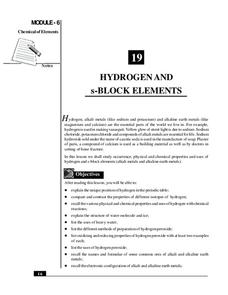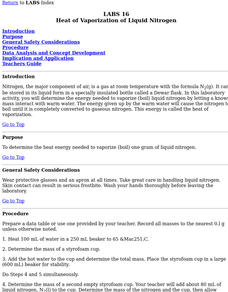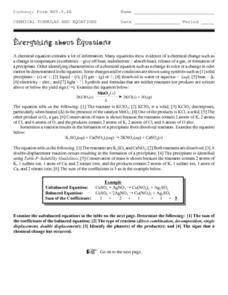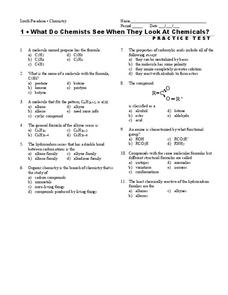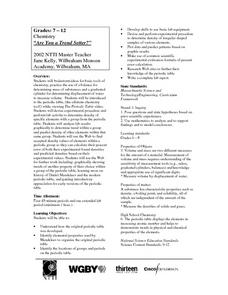National Institute of Open Schooling
Hydrogen and s-Block Elements
Lesson 19 in the series of 36 analyzes the element hydrogen and the s-block elements. Through readings, answering questions, and discussion, learners write about and explain their occurrence, physical and chemical properties, and...
Curated OER
How Can We Accurately Make Different Solutions of Different Concentrations?
Young scholars work together to create different solutions made from different concentrations of liquids. They record and analyze their data. They answer discussion questions to complete the lesson.
Curated OER
Matter and Chemical Bonding
For this chemical bonding worksheet, students read about the invisible killer, dihydrogen monoxide. Kids read about the products it is used in and the problems it causes to the environment. Then students complete 19 short answer questions.
Curated OER
Heat of Vaporization of Liquid Nitrogen
Young scholars determine the heat energy needed to vaporize (boil) one gram of liquid nitrogen.
Curated OER
What is the Thermal Depolymerization Process?
High schoolers examine the differences between Boyle's Law and Charles' Law. They discuss the concept of thermal depolymerization. They answer discussion questions to end the lesson.
Curated OER
Stoichiometry
Balancing equations is a foundational skill for starting chemists. There are a few slides in this PowerPoint with colorful diagrams that help to explain how. Unfortunately, the presentation begins with an unrelated table of contents and...
Curated OER
Introduction to the Mole
Students are introduced to the mole concept using a discovery-based method. Lesson includes activities with candy that allow students to discover the rules for mole-item, item-mole, mole-mass, and mass-mole conversions.
Curated OER
Binary Compounds
Binary compounds are explained with the periodic table, atomic charges, and examples. Viewers are taught to name binary compounds and then are presented with a chart of cations and ions. Finally, they see a few photos of forms of silicon...
Curated OER
So, the Test Is Positive
Students participate in a probability-based exercise. They consider the implications of testing positive for a cancer when the test is less than 100% accurate and analyze their results.
Curated OER
An Intuitive Introduction to Density
Students complete experiments discovering the relationship between density and mass. They use the internet to gather information before the experiment. They discuss the activity once it is completed.
Curated OER
Balancing Equations
In this balancing equations worksheet, students balance ten equations by placing the proper coefficients in front of reactants and products to balance the number of atoms.
Curated OER
Everything about Equations
In this chemical reactions instructional activity, students are given fifteen unbalanced equations and they must identify the reaction types, the phases of the products, the signs that a chemical change occurred and the sum of the...
Curated OER
Stoichiometric Relationships
In this reactions worksheet, students learn how to solve stoichiometric problems based on the mole ratios of a balanced equation. Then students complete 7 problems.
Curated OER
Molarity
In this molarity worksheet, students are given the equation to find moles per liter of solution. They solve ten problems finding molarity of solutions, moles needed to make particular molar solutions and mass needed to make particular...
Curated OER
Chemical Change vs. Physical Change
In this physical and chemical change activity, students are given a description of these changes. They are given ten changes that the students identify as chemical or physical changes based on their reading.
Curated OER
Conservation During Chemical Reactions
In this chemical reaction worksheet, students are given the details of an experiment where sodium chloride and silver nitrate are mixed in a chemical reaction. Students answer nine questions about the chemical reaction, they determine...
Curated OER
Balancing Equations and Identifying Reaction Types
For this balancing equations worksheet, high schoolers balance twelve equations by placing the proper coefficients in front of reactants and products and they identify the type of reaction each equation represents.
Curated OER
Understanding Chemical Equations
In this chemical equations learning exercise, students identify the reactants and the products, state what phase each is in, and state the mole ratios of all the products and reactants. Students complete 10 problems.
Curated OER
What do Chemists See When they Look at Chemicals?
In this chemicals worksheet, learners answer 15 multiple choice questions about chemicals, compounds, inorganic and organic molecules.
Curated OER
Using a Spreadsheet to Solve Gas Law Problems
Young scholars use a spreadsheet to solve gas law problems. In this gas laws lesson plan, students use the Express Calc program to load a spreadsheet for the gas law problems. Young scholars compute volume, temperature, or pressure...
Curated OER
Determine the molarity of an unknown HCl solution
Students complete a lab to help develop a comprehension of stiochiometry. They review equation writing, equation balancing, and stiochiometry. Studnets are given the following information: Sloppy students from the previous class have...
Curated OER
Are You a Trend Setter?
Young scholars are introduced to the periodic table of elements. They devise and perform and experiment in which they determine the density of specific elements. They use their results to predict the density of other elements in the same...
Curated OER
Identifying Reaction Types
In this reactions instructional activity, high schoolers are given nine chemical reactions to identify as single replacement, double replacement, synthesis or decomposition reactions.
Curated OER
Water: The Neutral Substance
In this water learning exercise, students read about hydrogen bonds in water and the differences in electronegativity between the oxygen atom and the two hydrogen atoms in water. Students answer four questions about the structure of...
